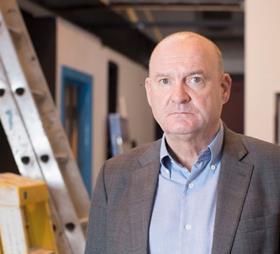London looks likely to be hardest hit by the ill effects of Brexit, especially if we end up leaving the EU without a deal. Jonathan Owen reports on what could be a perfect storm of labour shortages, logistics problems and rising prices

The only real certainty over Brexit is the sheer uncertainty surrounding this step into the unknown, as Britain prepares to become the first ever country to leave the EU.
Two years after the referendum in which the nation voted to leave, the government has yet to strike an exit deal with the EU and is increasingly talking about a no-deal Brexit as a real possibility. With time running out to come to an agreement with the EU, last week the Cabinet met for what amounted to crisis talks over what to do in the event of such a scenario.
The reality of Brexit is now just six months away, and construction industry figures are warning that London is set to take the brunt of the impact in what could be the biggest challenge to the sector since the 2008 financial crash.
“If we ended up without a deal of any sort then the possibility exists that there could be a real hiatus in activity in London”
Rudi Klein, Sec Group
Not only does the capital account for a huge chunk of UK construction activity, magnifying any negative effects on the industry there, but it has a disproportionate number of overseas workers. So, how worried should we be?
Reliance on foreign workers
One of the capital’s biggest assets in construction, its diverse, 300,000-strong workforce, could prove to be its Achilles heel. For London is far more reliant on foreign workers than other parts of the UK.
More than one-quarter (28%) of construction workers in London are from the EU, compared with the national average of 7%, according to the Office for National Statistics.
These workers are part of a wider pool of foreign labour from other nations around the globe. More than half the construction workforce (52%) in the capital is comprised of migrant workers, says the CITB.
Steve Radley, the CITB’s policy director, says: “London construction employers tell us that they are already feeling the effects of Brexit. Our research shows one in three firms reporting impacts on their businesses since the EU referendum. Looking ahead, almost half of London employers see it getting harder to recruit skilled staff.”
With no realistic prospect of a deal in sight, the outlook is bleak. Research by Cambridge Econometrics, commissioned by the mayor of London, Sadiq Khan, predicts that a no-deal Brexit would result in the loss of 5,000 construction jobs in the capital and the value of the construction sector’s output in London falling by £1.2���� up to 2030.
Barry Mortimer, London director of the Federation of Master Builders, says: “London’s construction sector has been heavily reliant on skilled EU workers for some years now […] Without access to EU workers, skills shortages will further intensify, threatening the capital’s housing and infrastructure projects.”
His concerns are echoed by Len Duvall, leader of the Labour Party group at the London Assembly, who says: “With more than a quarter of London’s construction workers coming from the EU, a no-deal – which is looking increasingly less like a ‘pie in the sky’ prospect – could be catastrophic for the industry.”
Brexit facts
300,000 people work in construction in London
28% of construction workers are from the EU
52% of the construction workforce comprises migrant workers
A £1.2���� loss in output for construction in London is forecast under a no-deal scenario
20-minute average time to check a single lorry at the border if no customs agreement is reached
5,000 fewer jobs in the construction sector under a no-deal scenario
30% drop in the total value of projects started on site in the capital in the first eight months of this year compared with the same period in 2017
80% of respondents to a survey by �ڶ����� of people working in construction in London think staying in Europe would be best for the sector
41% of respondents to the same survey had seen projects ranging between £50m and £500m being put on hold or abandoned due to Brexit
Sources: PWC; ONS; CITB; Cambridge Econometrics; port of dover; Cambridge Econometrics; Glenigan; �ڶ����� survey; �ڶ����� survey
Logistics as well as labour
But the crisis in labour is just one way the capital’s construction market will be hit. Another challenge facing London, as well as the rest of the country, is the threat to the “just-in-time” logistics underpinning many construction projects.
Failure to reach an agreement with the EU could see customs checks increase from two minutes per vehicle to 20 minutes, bringing the risk of long delays at the border, says Keith Winterflood, director of logistics specialist Wilson James. To allow for this, firms would need to ensure lorries arrived in Britain days earlier than needed. Winterflood warns Britain’s ports “could grind to a halt” under a no-deal Brexit.
The impact of Brexit will be magnified in London because of the sheer scale of construction work there, says Rudi Klein, chief executive of Specialist Engineering Contractors Group. “If we ended up without a deal of any sort then the possibility exists that there could be a real hiatus in activity in London,” he says.
Like many in the industry, Klein is frustrated at the lack of interest shown by the government in the sector, with construction seemingly ignored in the various briefings issued on the impact of Brexit. The government should produce advice for the industry in the event that no deal is reached, he says. A no-deal scenario amounts to a “gamble in a vacuum” with “no clear idea of what risks we could be looking at post-Brexit”.
Will Waller, director at Arcadis, predicts that leaving the EU without a deal “is probably going to make the skills crisis in London significantly worse”. He adds: “I can see a no-deal Brexit being very inflationary for the London market.” Asked if there could be a slowdown as bad as that seen in aftermath of the 2008 financial crisis, he says: “I really don’t think we can rule that out.”
The worst-cast scenario, according to Alasdair Reisner, chief executive of the Civil Engineering Contractors’ Association, is that “suddenly a very substantive proportion of the London [construction] workforce is asked to leave, but it’s incredibly unlikely that would happen”.
Reisner argues it is more likely there will be “significant uncertainty over any future migration”, which could result in foreign workers who return home not being replaced. The industry could also suffer from the wider economic slowdown being predicted, he adds.
Builders need a stable market in which to operate, where they can draw on labour from overseas, says Steve Turner, communications director at the Home Builders Federation. “London in particular is dependent on foreign labour, with some sites having 60% or 70% of the workforce from abroad. Any threat to existing or future workforce would have an impact on future levels of supply.”
Allan Wilén, head of business market intelligence at industry analysts Glenigan, says leaving the EU without a deal in place would have a “big impact” on demand. He predicts that any exodus of foreign workers from the capital would see London “start to draw in labour from other parts of the UK”.
The latest data from Glenigan on the value of construction projects in London shows that the total value of projects starting on site in the capital in the first eight months of this year was £6.1bn – 30% down on the same period last year.
A perfect storm
There are growing fears of a perfect storm in which construction could suffer from a drop in the value of sterling, a shortage of labour, and problems getting goods from Europe all combining to delay projects and see prices rise – threatening the viability of many projects.
A survey by �ڶ����� magazine of more than 200 people working in the sector in London revealed 41% have seen projects worth £50m to £500m put on hold or abandoned due to Brexit. And 80% want more clarity on Brexit migration policies so that they can plan for the future.
Keith Brooks, chairman of Cast, says if the fears of a no-deal Brexit triggering a recession are realised, then “London, being the powerhouse of the UK economy, would be particularly affected”.
He adds: “Should the government go down the WTO route, we’d face paying tariffs, pushing costs up and eating into margins further. But if the government went for unilateral free trade, it would create a potentially uneven playing field and risk decimating domestic producers.”
Asked what the government is doing to safeguard construction in London in the event of a hard Brexit, a Department for Exiting the EU spokesperson said: “When we leave the EU, freedom of movement will end and we will be creating an immigration system that delivers control over who comes to the UK, but that welcomes the brightest and best who want to work hard and contribute.”
They add: “In the white paper, we set out proposals to ensure continued frictionless access at the border to each other’s markets for goods.”
Sweeping assurances are one thing, but the reality is that London’s construction market is just six months away from entering uncharted territory – in a post-Brexit Britain – with all that could entail.
Housebuilder’s view

Monika Slowikowska is a director of housebuilder Golden Houses Developments, which won the London Build Excellence Award in 2017. The company, which is based in Islington, London, employs more than 150 staff, of whom 90% are overseas workers. Its clients include Tottenham Hotspur Football Club.
A no-deal scenario “will bring turmoil for the country and most of the businesses”, says Slowikowska.
In terms of her company, “everything” is at stake, she says: “Ninety percent of our workers are eastern European. Without the right to work in UK, my company will fold.
“In addition, lots of materials are being manufactured in Europe […] the cost of materials in the last year went up by 12%-15%. The lack of import/export deal will increase these costs even further, making the costs higher than lots of companies assumed, resulting in loss of profit and possible bankruptcies.”
Slowikowska says that if Britain leaves the EU without a deal, “the business will stop existing – we will probably not be able to complete the open projects, putting lots of clients in distress or major financial challenge”.
The government needs to understand that the “UK economy depends on foreign workers and imported materials”.
She adds: “If the existing and hopefully new workers from eastern Europe are prevented from working in the UK, the London construction market will collapse.”
In terms of the residential sector, the company boss comments: “People in London already cannot afford houses and 90% of all properties sold in London are sold on Help to Buy scheme. With such a major skill shortage, the prices of properties will go up, making these too expensive for Help to Buy and effectively unaffordable, creating a property crisis. This will have a snowball effect onto other industries.”
Decorating contractor’s view

Kevin McLoughlin is managing director of north London-based decorating contractor K&M McLoughlin, more than one-third of whose staff are not British. The firm has worked on Lord’s cricket ground, the British Museum and Arsenal FC’s stadium.
“If the industry picks up after Brexit the skills shortage will lay itself bare: there will be price inflation,” says McLoughlin. “I fear for the big majors locked into contracts based upon prices they’ve won the jobs on – if then wage inflation in the supply chain outstrips what they’ve actually got in for the job, that could be a problem.
“In terms of employers like myself, we are losing employees already and we will start to lose people to [other] companies who are paying more money, or [we will be] having to pay more money.”
Despite the difficulties, he is optimistic. “The industry will regroup and in the long term it will be fine. It’s the short-term disruption that’s going to happen, regardless of whether there’s a deal or not.
“I employ foreign workers; they’re not sure whether they’re going to stay in the UK or move on. One of the guys said, ‘We left our country to come and work here so it’s not a problem for us to move to another country,’ so I think that if the rest of Europe takes off then it will be a massive skill surge away, where people will go abroad.”
Residential + commercial contractor’s view

“It’s the staffing that’s really going to cause us huge problems, as well as material costs,” says Chakravarti.
The worst case scenario under a no-deal Brexit would be “if everyone left and went home”.
She adds: “We are trying to protect ourselves by building up more British-based teams of labourers, but at the moment it’s seeming that most of them will not be [in the country] and we will have to get new staff.
“If we can’t get new staff because obviously demand [for workers] will be high, then it could well be that we shut down. It could get to that stage, but obviously we are doing everything we can to avoid that.”
Refurbishment specialist’s view

“I am quite worried, to be honest,” says Boca. “I believe that if there is no deal the price will be paid mainly by the British customers, because all the prices will go up, and we won’t be able to find the labour resources to fulfil our projects.
“We are already feeling the pressure. Over the last six to nine months we’ve found it very difficult to fulfil our current projects and find the relevant subcontractors. We have had to overpay what we had allowed for tenders just to make sure we delivered the jobs.
“We had quite a few enquiries from other clients of ours, other developers, who actually asked for help on their other schemes because their subcontractors had let them down and they couldn’t find the resources so we had to go and help on different occasions.
“If there is no deal, our tendering prices will need to go up; I am sure there will be a period of time when there will be no work. We have added an extra contingency in case of no deal; we will have that margin to cover our direct costs.”



























No comments yet